THE sun is yet to rise on the outskirts of Orange in the NSW Central Tablelands, but beekeepers Charlie and Brenda Casido have already started work for the day. With 3,500 beehives to inspect every week, there is no time to waste.
Since setting up their company Australian Queen Bee Line 13 years ago, the industrious husband and wife team has built a solid business, growing from simple honey production into exporting a range of products all over the world including queen bees, honeycomb and royal jelly.
Charlie gained a knowledge and appreciation of bees during his childhood in the Philippines thanks to his father who worked in the agriculture industry. The apiarist recalls his father describing the importance of bees to the ecosystem and the pollination of plants and crops.
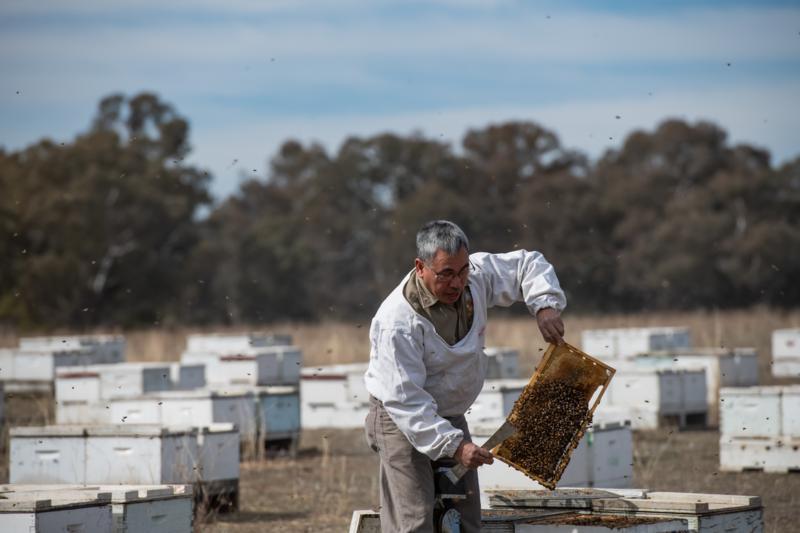 Apiarist Charlie Casido inspects some of his 3,500 beehives in Orange in the Central Tablelands.
Apiarist Charlie Casido inspects some of his 3,500 beehives in Orange in the Central Tablelands.
“I tried to learn as much as possible about the importance of bees and I realised I could use this knowledge to make my livelihood,” Charlie says.
“Orange is a special place to breed bees. It's easy to access the markets in Sydney. It's better than other places because of the climate.”
He began working with a honey company and in 1988 he was sent to Saudi Arabia to help expand the business there. He says honey plays an important role in Saudi culture, religion and the economy.
He met Brenda when he returned to the Philippines in 1990 and the couple later settled in Orange. “It is a special place for me to breed bees,” Charlie says. “First off, it’s easy to access the markets in Sydney. And for breeding conditions, it’s better than other places because of the climate.”
It was a hard slog and in the early days Charlie worked for a rural supplies company to pay the bills while he tended his beehives after hours.
*READ MORE about the industrious farmers across NSW adapting to boost their bottom line:
BEEKEEPING AS A FAMILY BUSINESS
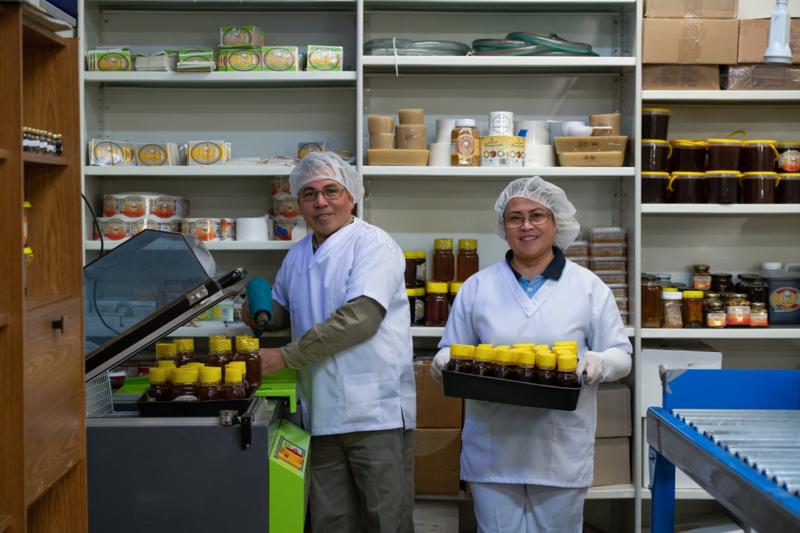 Charlie and Brenda are hands on in the production side of their honey business.
Charlie and Brenda are hands on in the production side of their honey business.
In 2003, Charlie registered the business with the Department of Primary Industries (DPI) and two years later Australian Queen Bee Line opened commercially with a small number of hives. By 2017, the family-run business hit its peak production and had 28 staff on the books. “We’ve only been working here in Australia for 13 years, so it’s not long,” Brenda says. “We can see the progress made, but it’s a lot of hard work and challenges.”
The business is a family affair. Charlie runs all the field work, Brenda is the business manager and oversees the factory production and paperwork, while their daughter Carol, who lives in Newcastle, does the online marketing on the weekends. Their son Charles intends to help out by taking a gap year in 2019.
Jonathan Tuckfield, NSW Farmers’ regional service & sales manager, has watched the Casido family grow the business from scratch. He says the support of the community, local bee industry and their NSW Farmers branch, has provided Brenda and Charlie with a platform from which to raise important concerns.
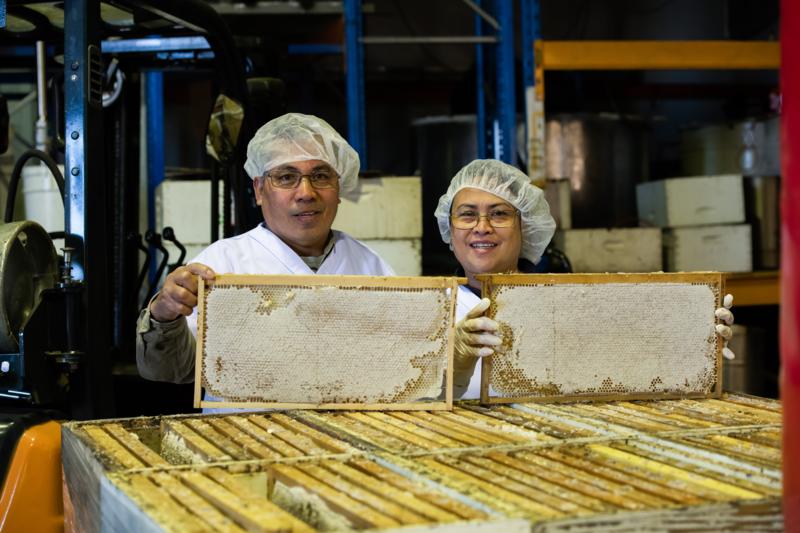 Charlie and Brenda check their honeycombs in their honey production facility in Orange.
Charlie and Brenda check their honeycombs in their honey production facility in Orange.
Some of the biggest challenges currently facing the industry include the biosecurity threat from pests and diseases, in particular the varroa mite, and low prices for Australian honey and pollination products in comparison with the increasing production costs that are impacting profitability.
*READ MORE about biosecurity concerns facing Australian farmers:
Another major challenge is
attracting long-term professional workers. Brenda and Charlie like to employ local staff, but to meet the growing demand for their products they have had to rely on overseas workers. Last year, the company packed 70,000 jars of honey headed for China. The
Chinese market is also keen to snap up their honeycomb.
And it is not just the Asian markets that are hungry for their products. Selling queen bees to Canada is now a major part of their business. Canada needs to import tens of thousands of queen bees a year, and due to pests and contamination in other parts of the world, Australia is one of a handful of countries allowed to supply them. Charlie says he can only supply 10,000-15,000 queen bees a year, due to the difference in seasons and the challenge of attracting staff.
“If there are other beekeepers that can provide queen bees I think that’s a good option to earn money,” Charlie says.
According to the latest DPI figures, the NSW beekeeping industry is estimated to contribute $36 million annually, representing 40-45% of Australia’s honey crop. On top of this, bees provide a vital pollination service to the Australian horticultural and cropping industries, estimated at $14 billion annually for the economy.
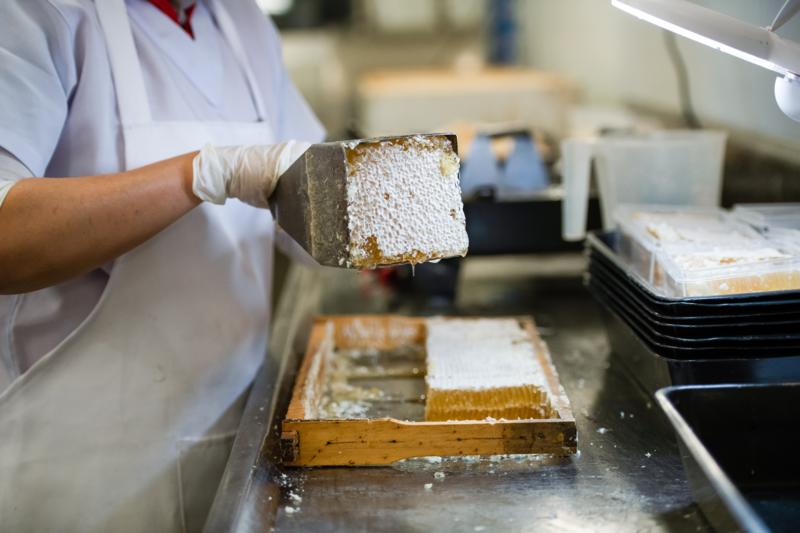 Australian Queen Bee Line produces a range of honey and honeycomb related products in its processing plant in Orange.
Australian Queen Bee Line produces a range of honey and honeycomb related products in its processing plant in Orange.
For many beekeepers, capitalising on the expansion of Australia’s almond crop by providing pollination services is now crucial to keeping them busy year-round. This year Charlie and Brenda took hives to Victoria to pollinate almond crops from July to September.
“We have signed a contract for 3,000 hives to pollinate the almonds and we will also take some of the hives to Young [in the NSW Riverina] to pollinate the stone fruits like plums and cherries,” Brenda says.
 Beekeepers Charlie and Brenda Casido with their Australian Queen Bee hives, near Orange, NSW.
Beekeepers Charlie and Brenda Casido with their Australian Queen Bee hives, near Orange, NSW.
One person who knows better than most the hard work that’s involved is Jodie Goldsworthy from Beechworth Honey in Victoria. A fourth-generation honey bee farmer, Jodie worries about the rapid decline in the number of beekeepers in Australia. “A lot of older beekeepers have simply exited the industry with no-one necessarily taking up their operations,” says Jodie.
An Australian government report released in December 2016 stated there were 13,000 registered beekeepers operating across Australia. Over the 10 years to 2015-16, the number of commercial beekeepers (with 50 or more hives) and the number of hives fell by 25%. However, at the same time, the total number of registered beekeepers rose by more than
3,000, driven by hobbyists with a small number of hives.
BEEKEEPING INDUSTRY FACTS
$36 million annual contribution to the economy by the NSW beekeeping industry
$14 billion estimated value of the pollination services provided by australian beekeepers to the horticultural and cropping industries.
Bees require constant floral fuel to sustain them and, as Jodie explains, Australia has by far the most difficult and complex beekeeping system in the world. Hives need to be migrated across landscapes to maintain production and floral resources are unpredictable due to drought, bushfires and land clearing.
“I tried to learn as much as possible about the importance of bees and I realised I could use this knowledge to make my livelihood,” Charlie says.
“You've got to be an absolute scientist as well as an artisan craftsperson in the art of beekeeping,” she says.
However, the increased public interest in bees and media attention on dwindling bee numbers has seen beekeeping make a comeback. “Never before has there been greater public interest in beekeeping,” Jodie says. “Part of that is due to the Flow hive phenomenon [harvesting honey without disturbing the bees], and part of that is due to people wanting to keep bees at home and being worried about the environment.”
BENEFITS OF BEES
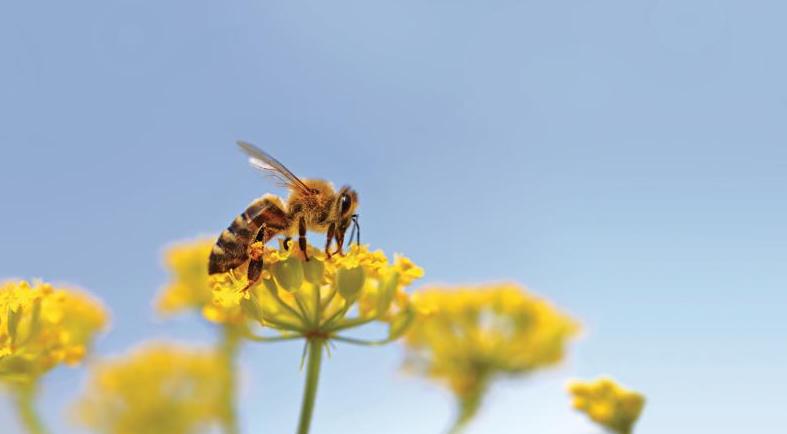
POLLINATION
About 53 different food crops depend on bee pollination for production.
HEALTH
Bee propolis (a mixture of bee saliva and beeswax) is used on sores, wounds and infections, while bee venom is used to treat rheumatoid arthritis.
HONEY
The bee is the only insect that produces a food consumed by humans.
BIODIVERSITY
Bees play an important role in the life cycle of most plants and flowers